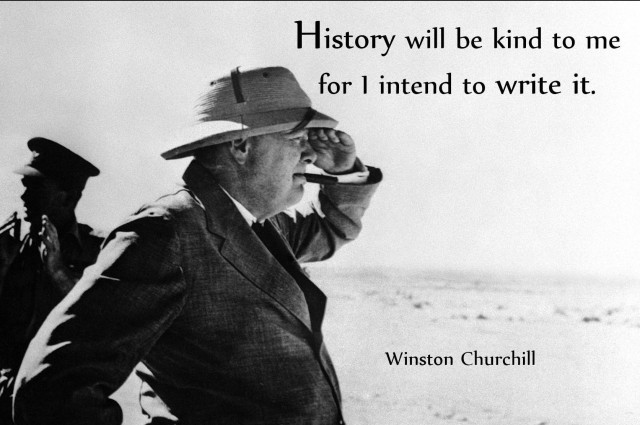I have been hearing about interpretations of truths, multiple truths, and the way they affect the process of recording events, causes and consequences, structures and arrangements of a particular time period in a certain geo-cultural space. As a student of history, the process of historical writing, historiography and history itself are studied together, and we are meant to critically examine everything that we come across. Every piece of evidence is a subject to question. This is a way to look for truths of the past. This is a process full of uncertainties and historians make a lot of effort to recover and report the truth as much as possible.
We do understand that historical facts are subject to how others understand those facts, or revise them again, and the conclusions they reach might be differ from others greatly. This is called historical revisionism and is essentially academic and considered legitimate.
But then, there are people who use the same facts, skew the details, and use their personal discretion while reporting and then, the manner with which they conclude the story and their intentions behind that are fixed. The aim at shaping the whole study and pushing it towards the one objective they have in mind, and evidently enough, are not flexible with other possible conclusions. This entire idea of illegitimately distorting history is called negationism. The political usage of history is where domination of negationism can be seen.
Looking at some examples, we have imperialist historians, who used ability to understand, formulate and disseminate ideas to downplay the significance of Indian history; nationalist historians, who tried to compensate for all that the study of Indian history suffered under imperial history writing, and then, in the process, forgot where exactly to stop (nationalist historians are known for exaggerating); for both, history was an instrument of either degrading and disintegrating a group of people of a particular culture, or upgrading and integrating the same.

Rightist institutions, for instance, try to create this image of ancient Indian civilisation as some sort of strong cultural, political and economic motherland out of which the rest of the countries in the subcontinent or around the subcontinent were born.
The emphasis on the superiority of Hindu nationalism and backing it by random, ill-substantiated theories and assumptions are greatly misleading, and they can be accessed by people easily, youth especially, with their opinions still impressionable and growing. And thinking about it, no one takes the responsibility of all the whims they have about history and bringing their opinions and discourses for people to read and absorb it all in. Nobody can hold them responsible for voicing for a certain section of the society, which is absolutely dumb and blind and extremist.
Apart from private right wing pseudo-intellectual institutions, there are state governments which actually are lacing educational textbooks with the statements which are somewhat or even completely divorced from reality, which they so strongly believe in. These pieces of information are not only incorrect in varied degrees, but also a form of propaganda.
“Two social science textbooks for Class V and VIII, drafted by a Karnataka government committee, carry a map of Akhand Bharat (indivisible India) wherein Indian civilisation envelopes Pakistan, Afghanistan, Tibet, Nepal, Bangladesh, Myanmar, Bhutan and Sri Lanka-essentially a concept envisioned by the Rashtriya Swayamsevak Sangh (RSS).”
(SOURCE : “In Karnataka, Pakistan is Part of India” | India Today | 2012)
India isn’t exactly the only one, though – this has been happening in a lot of countries, for instance, in Pakistan, textbooks have been accused of putting in incorrect information, and promoting extremism and Indophobia!
Tampering with the already available information and slipping in extra, unnecessary, and possibly false details is just one sort of distortion. The other would be overlooking facts, which is equally harmful, because here, history is a sequence of events, and leaving facts intentionally out of the sequence – facts which are important and significant – is, in a manner, misleading. Events like genocide and crimes against humanity and the related or the similar are generally not taken in as a part of the sequence that the authority wants the people to know. Governor Margaret Alva, during a seminar, said,
“Distortion of history and suppression of past follies neither heal the sense of injustice and victimhood nor can it lead to final closure. Past crimes against humanity need to be confronted and acknowledged, to enable us to learn and move on.”
(SOURCE : Distortion of history doesn’t heal sense of injustice: Alva |
Times of India | 2013)
The point is… history is something every person in this society should be familiar with, because it helps us greatly to understand our society as it is today. We are a result of whatever happened in the past – and in that sense, history cannot be ignored. As it is, the study of history in India, even at the most basic level, isn’t considered the most interesting thing to do.
How can we expect ourselves to become individuals with a holistic understanding of our society if we don’t even try to learn our history and if we do, we don’t learn the sequence with everything in place, as a part of some propaganda?
Verifying history and then, the process of construction of history is a very uncertain area to venture into, and most of it depends upon what the truth is or what we think it is, or the perceptions of truth prevalent at a certain point of time. But, the most that we can do, is to use to use our intelligence, and question things being fed to us, than taking in everything and not questioning anything at all.


































